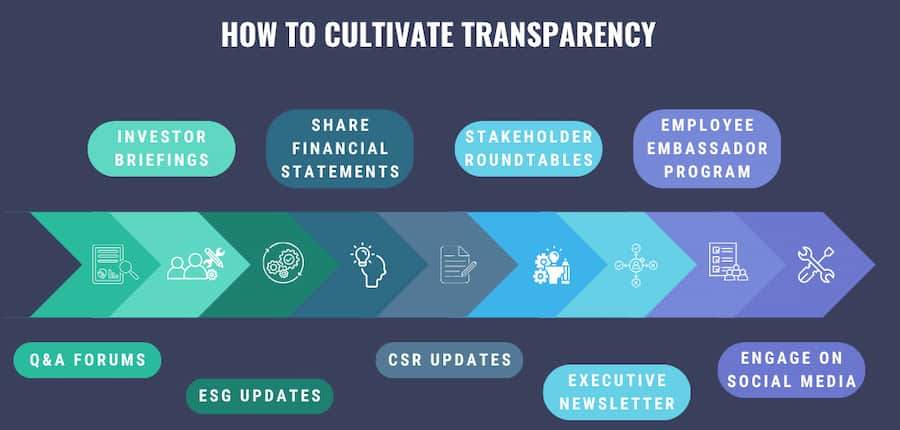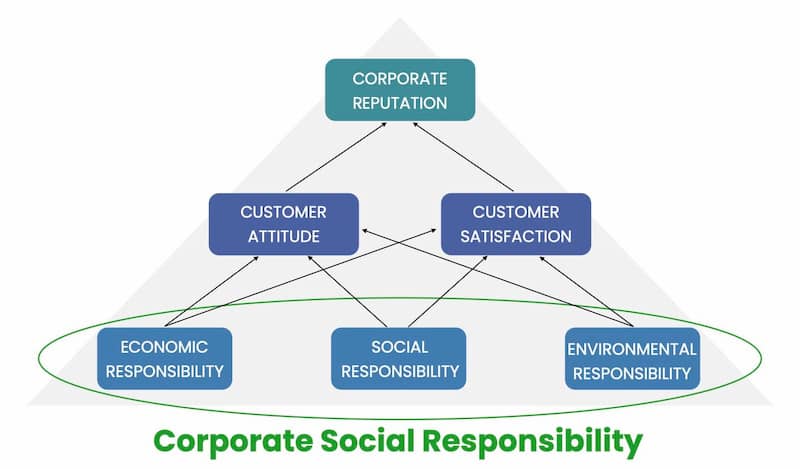Strategies to Boost Investor Confidence and Public Trust
Investor confidence is heavily shaped by how stakeholders evaluate corporate signals, not just by financial performance. Recent research highlights that corporate reputation is best understood from the stakeholder-as-evaluator perspective.
TL;DR
Transparency creates trust. Think of your company as a glass house—every action is visible. Clear communication of your successes, setbacks, and strategies minimizes misunderstanding and builds lasting confidence. Patagonia’s candid reporting of its environmental impact is a great example; stakeholders appreciate honesty even when it’s not perfect.
Consistency turns intentions into beliefs. Every message—financial updates, press releases, or social media interactions—should reflect your core values.
Leadership sets the tone. Your senior team’s actions reveal your company’s true priorities. Ethical leadership communicates integrity far louder than any statement. Satya Nadella’s ethical guidance at Microsoft strengthened public and investor trust, steering the company beyond controversy into lasting success.
Visible responsibility shows genuine commitment. Sustainable practices and meaningful community initiatives prove your company isn’t solely about profits. Salesforce’s “1-1-1” philanthropy model directly invests company equity, products, and employee time into worthwhile causes, resulting in strong public support and loyalty.
Active engagement builds established relationships. Regular updates, honest feedback loops, and genuine conversations enhance trust over time. Conducting investor Q&As, townhalls, or responding proactively to stakeholder concerns nurtures relationships.
Digital reputation shapes daily perceptions. Online reviews, constructive interactions, and transparency ensure your digital narrative matches reality. Starbucks demonstrates this by proactively addressing both positive and negative feedback online.
Trust is dynamic; measure and adapt accordingly. Treat reputation monitoring as continuous improvement, responding to feedback and proactively refining your strategy. Tools to measure public perception, investor sentiment, and customer satisfaction can drive actionable insights, guiding strategic changes quickly.
Now that we’ve set the stage, let’s explore each of these principles in greater detail.
Identifying Key Factors Affecting Investor Confidence and Public Trust
Understanding the Role of Transparency
Stakeholders expect transparency not just because it’s popular, but because it reassures them you’re open to scrutiny. Companies like Patagonia don’t sugarcoat their environmental impact; they’re transparent about both success and shortcomings. This candid approach earns loyalty because it shows stakeholders you respect their intelligence and value their trust.

To cultivate this at your own organization, hold frequent investor briefings and Q&A forums. A CEO who communicates with candor and consistency can reduce uncertainty and strengthen investor trust, even during volatile periods. Clearly communicated financial statements and ESG updates, without excessive jargon, boost your credibility and make transparency a natural part of your business culture.
Ethical Leadership and Its Impact
I’ve seen firsthand how leadership shapes company culture and external perceptions. Leaders who consistently behave ethically—like Satya Nadella’s transparent and values-driven approach at Microsoft—strengthen stakeholder trust and loyalty.
Ensure your actions as a leader align directly with your stated values. Transparent decision-making, fairness, and accountability become the norm when the top sets the right example. Employees and investors notice and respect this clarity of purpose.
Delivering Consistent Messaging
To build lasting trust, ensure what your company says publicly matches actual business practices. Tesla’s steadfast messaging on renewable energy perfectly aligns with their product strategy, helping investors ride out market volatility.
Implement regular, cross-functional discussions among your PR, marketing, and leadership teams. Checking alignment across these groups clarifies messaging, reduces contradiction, and demonstrates you can reliably deliver on promises.
Proven Strategies to Enhance Investor Confidence
Strengthening Financial Reporting and Disclosures
Transparent financial reporting signals accountability and stability—crucial for building investor confidence. Microsoft stands out in this area, presenting financial details clearly alongside analysis and visual aids. This approach helps investors digest complex data and gain helpful context.
Go beyond basic reporting. Include clear narratives, visuals that clarify financial data, and regularly scheduled updates, addressing challenges honestly as Netflix does through their frank quarterly updates. Consistency proves you have nothing to hide—strengthening trust over time.
Building Public Trust Through Corporate Responsibility

Integrating Sustainable Practices
Today’s stakeholders expect sustainable practices woven into daily business operations—not simply mentioned in mission statements. Patagonia’s diligent, measurable environmental efforts make the company’s claims credible, proving it’s genuine about more than just profits.
Identify impacts specific to your company and set realistic, transparent ESG targets. Report your progress openly, even when you fall short—stakeholders appreciate authenticity over perfection.
Supporting Community Engagement
Public trust thrives when corporate engagement goes beyond writing checks. Salesforce, through its “1-1-1” program—pledging equity, product, and employee volunteer time—shows that strategic social impact deepens ties with customers, employees, and investors.
Choose causes aligning closely with your corporate identity. Involve your employees actively and communicate progress transparently. Genuine community engagement creates meaningful long-term relationships beyond transactions.
Partnering with Ethical Organizations
Your partnerships reflect your own reputation. Unilever ensures their partners adhere to ethical practices, reinforcing their supply chain integrity and brand trustworthiness.
Proactively vet potential partners on ESG standards and ethical operations. Sharing openly why these organizations fit your values enhances credibility further and reassures stakeholders you’re consistently principled.
Leveraging Digital Reputation for Trust Building
Importance of Online Reviews and Feedback
Today, online reviews strongly influence trust and decision-making. Starbucks proactively manages feedback online, swiftly addressing negative comments and transparently solving problems in real-time.
Actively encourage customers and partners to leave honest reviews. A dedicated team responding promptly and positively to online comments goes a long way in building your company’s digital credibility.
Harnessing Social Media for Transparency
Beyond marketing, social media should reflect your company’s personality, values, and transparency. Patagonia demonstrates their authenticity consistently via social sharing—even on challenging topics.
Cadenced social media updates help manage perceptions and signal openness. Engage genuinely on these platforms to resolve issues or add valuable perspective. Structured, consistent interactions on social channels showcase your company’s active commitment to stakeholder dialogue.
Connecting Strategies to Corporate Reputation Management
Investor and public trust initiatives merge naturally into your broader reputation strategy. Warren Buffett’s carefully written shareholder letters align tightly with Berkshire Hathaway’s reputation—even investors outside the firm applaud his authenticity.
Focusing on transparent reporting, ethical leadership, and active engagement creates lasting credibility. This doesn’t just manage your reputation, it actively builds trust that investors value highly as you grow.
Monitoring and Measuring Impact
Establishing Metrics for Success
Align clear KPIs to your reputation efforts. Track metrics like investor sentiment, customer feedback, and media analysis. Microsoft emphasizes both financial and non-financial metrics, providing an accurate snapshot of stakeholder confidence and perception.
Use sentiment analysis tools, surveys, and regular outreach to measure both public and investor trust. Staying proactive highlights transparency and positions your organization ahead of concerns rather than reacting to them.
Adapting Strategies Based on Feedback
Regular reviews of your progress—and transparent adjustments—show stakeholders you’re responsive, agile, and committed. Take Tesla’s shifting approach when facing production bottlenecks: Elon Musk publicly discussed challenges and outlined solutions clearly, restoring investor confidence throughout volatile periods.
Direct channels such as townhall-style meetings or investor calls create opportunities for candid discussion, making ongoing refinement part of your culture. Remaining flexible and open to authentic feedback demonstrates your organization’s integrity and long-term commitment.
Final Checklist: Five Investor Confidence Builders
Building and maintaining investor confidence isn’t just about quarterly earnings. It’s about consistently signaling trust, competence, and long-term vision. Here are five actionable areas every leadership team should prioritize:
- Transparent Communications: Investors reward clarity. Regular, straightforward updates, not just when things go well, reduce uncertainty and strengthen trust. Silence or overly polished spin often raises more red flags than bad news itself.
- Digital Fluency: A board or executive team that demonstrates understanding of AI, cybersecurity, and digital transformation inspires confidence that the company can adapt and thrive in a fast-changing environment.
- ESG Leadership: Environmental, social, and governance performance is no longer optional. Boards are increasingly judged on their ESG strategy, with media coverage of corporate responsibility playing a strong role in shaping reputation.
- Proactive Media Engagement: Legacy news media still shape reputation more than corporate social channels. Building strong relationships with respected outlets ensures that your story is told fairly, which reassures both investors and stakeholders.
- Crisis Readiness: Investor confidence is fragile in moments of crisis. A well-practiced response plan that covers communications, operational resilience, and leadership visibility helps contain reputational damage.
Use this checklist as a reputational audit tool: if your leadership team is weak in one or more of these areas, investor confidence may be more vulnerable than you think.
Conclusion
Trust isn’t something you earn once and keep permanently; it’s built continually, each day and every interaction. True reputation management—a blend of transparency, consistency, ethical leadership, and measurable impact—will strengthen both investor confidence and public trust.
As you put these strategies into practice, your genuine approach will resonate with stakeholders who appreciate authenticity. The genuine trust you build becomes your true competitive edge, deepening connections with investors, customers, and communities—one action at a time.
